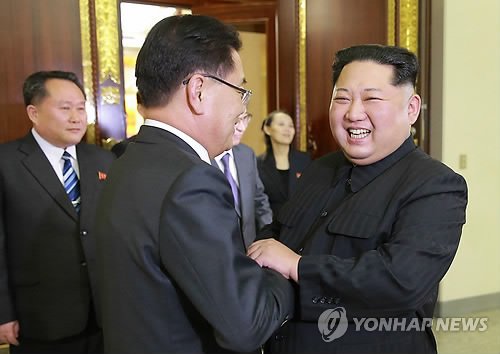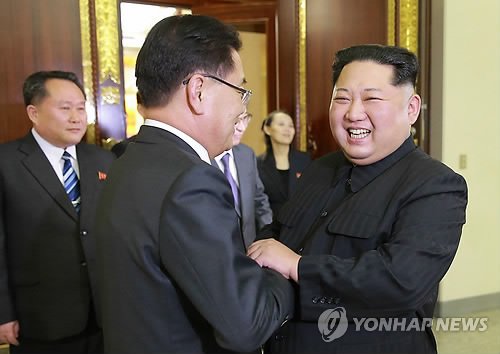Pyongyang, North Korea 06 March 2018 (Yonhap)
North Korea’s top leader Kim Jong-un (R) greets Chung Eui-yong, South Korea’s national security adviser, in Pyongyang on March 5, 2018.
Chung led South Korea’s delegation on a two-day visit to the North to help revive cross-border dialogue and spur North Korea-U.S. talks.
The North’s Korean Central News Agency, which released above photo, said Kim and the delegation exchanged opinions on an inter-Korean summit and multilevel exchanges.
South Korea and North Korea have agreed to hold a summit of their leaders late next month, South Korean President Moon Jae-in’s top security adviser said Tuesday on the outcome of his trip to the communist North.
Chung Eui-yong said the third inter-Korean summit, between Moon and the North’s reclusive leader Kim Jong-un, will be held at the Peace House, a South Korean facility in the joint security area of Panmunjom located just south of the inter-Korean border.
The summit, if held, would mark the first time a North Korean leader has stepped on South Korean soil since the end of the 1950-53 Korean War.
The surprise announcement followed Chung’s two-day trip to Pyongyang as Moon’s special envoy.
While in the North Korean capital, Chung and four other South Korean envoys held an unprecedented meeting with the reclusive North Korean leader.
“The South and the North have agreed to set up a hotline between their leaders to allow close consultations and a reduction of military tension, while also agreeing to hold the first phone conversation before the third South-North summit,” Chung told a press briefing.
North Korea has also restated its commitment to rid itself of nuclear weapons, according to Chung.
“The North side clearly affirmed its commitment to the denuclearization of the Korean Peninsula and said it would have no reason to possess nuclear weapons should the safety of its regime be guaranteed and military threats against North Korea removed,” he said.
The North also expressed its willingness to hold “candid” talks with the United States on ways to realize the denuclearization of the peninsula and normalize the countries’ bilateral ties.
From the onset of his two-day trip to North Korea, Chung said his mission included persuading the North to resume its dialogue with the United States, which the South Korean president earlier called a prerequisite to restarting international negotiations on ending the North’s nuclear ambition.
Both Washington and Pyongyang have expressed their willingness to talk, but the U.S. had remained rather skeptical of the North’s intentions in improving its ties with the South, saying U.S.-North Korea dialogue would only be held under the right conditions.
The White House has also said it will first see if the North’s willingness to talk represented its willingness to denuclearize.
Chung said the North Korean leader has agreed to put the denuclearization issue on the dialogue table with the U.S. without any conditions.
“Chairman Kim said the denuclearization issue may be discussed as an agenda for the North-U.S. dialogue,” he told reporters. “What we must especially pay attention to is the fact that (he) has clearly stated that the denuclearization of the Korean Peninsula was an instruction of his predecessor and that there has been no change to such an instruction.”
The North Korean leader assumed power after his father, Jong-il, died in late 2011.
Chung said the North has also promised to suspend all military provocations, including nuclear tests and ballistic missile launches, as long the U.S.-North Korea talks are progress.
“In addition, the North promised not to use not only nuclear weapons but also conventional weapons against the South,” he added.
North Korea has staged 10 ballistic missile launches since Moon took office in May 2017. It also conducted its sixth and most powerful nuclear test so far in September.
Demonstrating the apparent thaw in inter-Korean ties, the North has invited a South Korean taekwondo demonstration team and an art performance team to perform in Pyongyang. The visit, if made, will reciprocate earlier trips to South Korea by their North Korean counterparts during the PyeongChang Winter Olympic Games held Feb. 9-25.
The recent rapprochement between the two Koreas followed the resumption of inter-Korean dialogue to discuss the North’s participation in the Winter Olympic Games. The talks were the first of their kind in more than two years.
Moon’s envoys to North Korea included Suh Hoon, head of the country’s spy agency, the National Intelligence Service.
Chung said he and Suh will soon visit Washington to explain the outcome of their North Korea trip.
After their return from the U.S., Chung will visit China and Russia and Suh Japan.
The four countries are members of the so-called six-party de-nuclearization talks, which also involve the two Koreas. The talks have been stalled since late 2008.
According to Official News Agency of South Korea ‘Yonhap’, members of South Korean delegation include Yun Kun-young, a Cheong Wa Dae official in charge of a policy monitoring office, Chung Eui-yong, chief of the National Security Office, Kim, Suh Hoon, head of the National Intelligence Service (NIS), Vice Unification Minister Chun Hae-sung and Kim Sang-gyun, a senior NIS director.



Comments
Comments are closed.